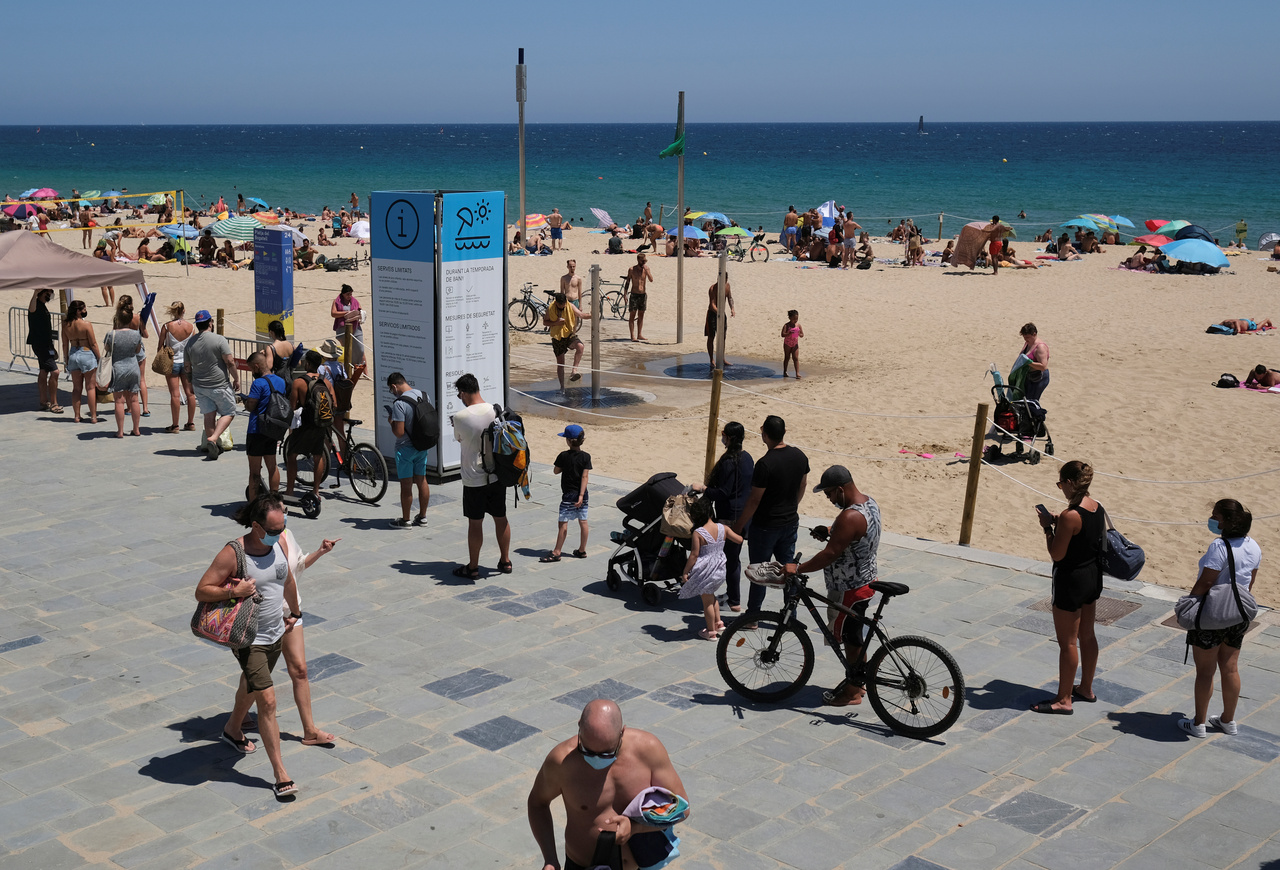Spanish PM Sanchez says UK made an ‘error’ in dealing new tourism blow
Sign up now: Get ST's newsletters delivered to your inbox

People queue to enter the beach in Barcelona on July 19, 2020.
PHOTO: REUTERS
Follow topic:
MADRID (REUTERS) - Britain made a mistake when it decided at the weekend to slap a quarantine on people travelling from Spain, Prime Minister Pedro Sanchez said on Monday (July 27), saying most of the Mediterranean country had a lower coronavirus infection rate than the UK.
Sanchez was speaking just after Britain dealt a new blow to any hopes of reviving Spain's tourism by extending guidance advising against all non-essential travel, which already applied to mainland Spain, to include the Balearic and Canary Islands.
"The error is to have looked at the incidence (of the virus) in the country as a whole," Sanchez said in an interview with Telecinco television.
The rebound in cases is focused in two regions, Catalonia and Aragon, while "in the rest of the territories, the incidence is much lower, (lower) even than that of the United Kingdom," he said.
Last year, Britons made up over a fifth of foreign visitors to Spain, which relies heavily on tourism.
The Socialist prime minister said the British government had given Spain no heads up about the quarantine move.
Nevertheless, both teams are in touch and Madrid is trying to persuade British Prime Minister Boris Johnson's government to change its mind, Sanchez said, adding that the two governments were "friends".
But the latest British move, announced shortly before Sanchez's evening interview, did not bode well for Spain's chances of getting the British government to change tack any time soon.
While Madrid was focusing its efforts on getting the Balearic and Canary Islands, which have a low coronavirus rate, off the quarantine list, London instead decided to add them to its guidance advising against all non-essential travel.
Earlier on Monday, Spain's hard-hit hotels had offered to pay for foreign tourists to take coronavirus tests, in an effort to lure back visitors worried by a fresh wave of cases and put off by Britain's sudden imposition of a two-week quarantine.
Since ending its nationwide lockdown a month ago, Spain has been grappling with a rapid proliferation of new cases.
The Health Ministry reported 6,361 new cases over the weekend and said it was monitoring 361 clusters around the country.
With most new infections concentrated in Catalonia and Aragon and with several other regions having a lower infection ratio than Britain, the blanket quarantine has been criticised by tourism groups as disproportionate and impulsive.
Britain's transport minister cut short his own holiday in Spain to return home to handle the fallout.
"The sooner I get back from Spain myself, the sooner I can get through quarantine," Grant Shapps said on Monday.
'A BADLY MANAGED OVERREACTION'
While Catalan leader Quim Torra warned that more restrictions could be needed if the local outbreak continued to expand, other regions such as Andalusia and Valencia felt unfairly penalised.
"Our epidemiological data are better than the UK's," Valencian regional leader Ximo Puig told Cadena Ser radio. "I don't understand why you would make a decision like this with such a broad brushstroke."
Puig's counterpart in the Canary Islands, Angel Victor Torres, said the shock to the local tourism sector could be irreversible if Britons stopped coming.
Tour operators, airlines and hotel groups, already struggling after the pandemic brought global air travel to a virtual standstill, also hit back at the measure. Budget carrier Ryanair's Chief Executive Michael O'Leary derided the UK move as a "badly managed overreaction".
Separately, Global airline body IATA criticised Britain's snap decision to re-impose coronavirus quarantine measures on travellers from Spain as a severe blow to recovery hopes that was disproportionate to health risks.
"This is a big setback for consumer confidence that is essential to drive a recovery," the International Air Transport Association said in an emailed statement on Monday.
The move "does not accurately reflect the risk of a regional spike in one corner of the country," IATA said - adding that restoring confidence in travel would depend on governments "working together to isolate and precisely manage risks" rather than a "stop-and-go" approach to restrictions.
"The UK's decision falls short of the mark," it said.

